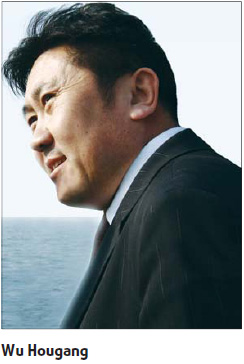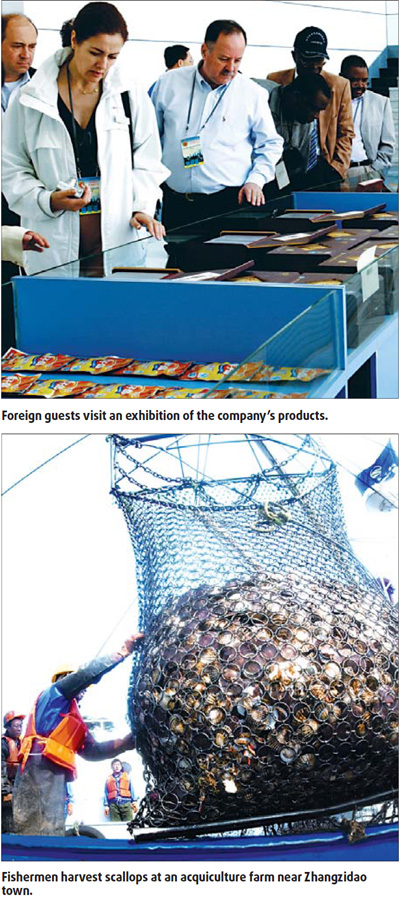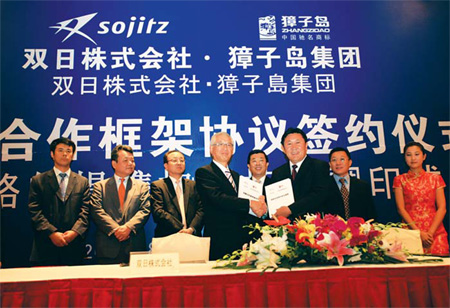Fishery Special: Zhangzidao: New standards in oceanic aquiculture
|
A partnership between Zhangzidao and Japan's Sojitz was a big step in the seafood company's plans for international markets. |
If it passes a European Union (EU) inspection now underway, Dalian's Zhangzidao Fishery Group will become the first producer of scallops permitted to ship the mollusks to the EU after their import from China was banned in 1997.
The EU's Food and Veterinary Office will conclude the study on Sept 10.
"As a leading enterprise in the fishing sector, Zhangzidao Fishery has been assisting the Chinese government in lobbying the EU to remove the ban," said Wu Hougang, chairman of the company.
Established in 1958, Zhangzidao Fishery now has more than 4,000 employees and total assets of 1.8 billion yuan.
It was listed on the Shenzhen stock exchange in 2006 and has branches in the United States and Hong Kong.
The fishery works on 50,000 hectares of sea, China's largest breeding area for seafood including Yezo scallops, sea cucumbers and abalone.
Wu said the Zhangzidao Fishery has a complete industrial chain that includes hatching, farming, processing and trading in aquatic products.
"The group also has a global sales network reaching markets in Europe, the US, Australia, Japan and South Korea," Wu said. "Our sales reached 1 billion yuan last year."
Quality prioritized

Wu said the fishery's leading products have passed all certifications for aquatic products in China as well as the ISO9001 quality management accreditation, Hazard Analysis and Critical Control Point certification and British Retail Consortium technical standards.
In March the fishery established the Zhangzidao Food Laboratory in cooperation with Switzerland's SGS Group, a 131-year-old inspection, verification, testing and certification company.
Zhangzidao has also invested heavily to improve ocean water quality and improve the environment for cultivation.
A monitoring ship regularly measures the sea around Zhangzidao township where the company is located.
The town has itself invested 30 million yuan for environmental protection.
Following widespread efforts, the sea area around Zhangzidao town has been verified by the National Marine Environmental Monitoring Center as suitable for producing pollution-free aquatic products.
Technology innovation
The fishery's capacity in innovation and laboratory work has been greatly enhanced through long-term cooperation with the Ocean University of China, the Chinese Academy of Fishery Sciences and the Institute of Oceanology at the Chinese Academy of Sciences.
Their combined research has resulted in several new ways of cultivation, including multi-species seeding technology.
The fishery disperses about 3 billion Yezo scallop seeds every year, as well as those for abalone, sea cucumbers, urchins and surf clams.
International cooperation
In 2003, Zhangzidao established the joint venture Dalian Xiangxiang Global Food Co Ltd with Japan's Sojitz Corp, a Fortune 500 company, to build the first ultra-low temperature tuna processing plant in northeast China. Its tuna now has 70 percent of the Chinese market.
On August 20, the two companies signed a strategic cooperation framework agreement that marks a new stage in their partnership.
Yutaka Kase, president and CEO of Sojitz, said he believes the deal will increase sales of seafood and create new food processing projects.
Zhangzidao Fishery also does business with Japan's Maruha, the world's top fishery company.
In 2008, the fishery took out a 100 million yuan insurance policy with China Fishery Mutual Insurance Association.
Despite the ongoing financial crisis, its sales revenue in the first half of 2009 reached 540 million yuan, up 59 percent over the same period of 2008, resulting in profits of 47 million yuan, an increase of 21 percent.

(China Daily 09/10/2009 page61)















